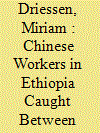|
|
|
Sort Order |
|
|
|
Items / Page
|
|
|
|
|
|
|
| Srl | Item |
| 1 |
ID:
178756


|
|
|
|
|
| Summary/Abstract |
Ever since Beijing has sought to fuel domestic growth through Chinese-led development overseas—first under the aegis of Jiang Zemin’s Going Out Policy and more recently as part of Xi Jinping’s Belt and Road Initiative—thousands of Chinese have moved overseas for work. Africa has been one of the destinations of Chinese companies and their expatriate staff. Although we have learned a great deal about China’s mega-projects across the African continent, little is known about the certified engineers and experienced builders who carry them out. What brings them to Africa? And, more importantly, what makes them stay for years on end, even if they wish to return to China? In this article I zoom in on the lives of Chinese men employed in Ethiopia’s construction industry to show how three decades of domestic growth in China has pushed workers overseas, while jeopardizing their return. Workers’ lives are marked by double displacement. They are not only isolated from local African communities through a dormitory labour regime that controls their time and limits their mobility, but also, more importantly, they are displaced from social life in China. Domestic development has at once increased aspirations and made them harder to obtain, especially for men, who are expected to fulfill the promise of upward social mobility for themselves and their families. In order to realize aspirations and meet social expectations related to social reproduction, geographic mobility has become a necessity for men who cannot rely on family wealth or connections, forcing them into a state of suspension.
|
|
|
|
|
|
|
|
|
|
|
|
|
|
|
|
| 2 |
ID:
139549


|
|
|
|
|
| Summary/Abstract |
By shedding light on the concept of the fangnu (mortgage slave), this paper explains why young men from China migrate to Ethiopia. Young, educated, employed and ambitious, the fangnu is a modern type of slave who is said to have sold his freedom to the bank for the purpose of buying a house. For young men coming from a rural background, temporary migration offers a chance to earn the money so badly needed for a down payment or repayments on mortgage loans for their newly bought residential property. I argue that the fangnu is the child of a Chinese society characterized by high social mobility as well as a growing demographic imbalance owing to the one-child policy. In this context, a house – or in urban China, commonly an apartment in a high-rise building – is increasingly seen as a marker of status, especially in the marriage market. Although the Chinese do not demand a bride price, the hunfang (marriage house) has become the norm in urban Chinese society. Unable to rely on the financial support of their kin, young Chinese men from the countryside migrate to earn the starting capital needed to cope with the socio-economic pressures of settling in the city.
|
|
|
|
|
|
|
|
|
|
|
|
|
|
|
|
| 3 |
ID:
174646


|
|
|
|
|
| Summary/Abstract |
The Chinese-run construction sites that have emerged across the Ethiopian landscape over the past two decades have given rise to a pidgin—a contact language that facilitates communication between Chinese managers and the Ethiopian labourers under their direction. By unravelling the nature of this pidgin, including its lexicon, syntax, and semantics, this article discusses the power dynamics in Ethiopian–Chinese encounters through the lens of language. A prototypical contact language at first blush, the pidgin spoken on Chinese road projects in Ethiopia is different from pidgins that emerged in colonial Africa. Its structure and use reveal that power relations between Chinese management and Ethiopian rank and file are less asymmetrical than often portrayed. As a site of contestation as much as collaboration, pidgin has in fact become one of the domains in which power is negotiated. By hijacking words and manipulating their meanings, Ethiopian workers play with pidgin in an attempt to confront expatriate management and challenge the sociopolitical asymmetries that the growing Chinese presence in their country has brought forth.
|
|
|
|
|
|
|
|
|
|
|
|
|
|
|
|
|
|
|
|
|